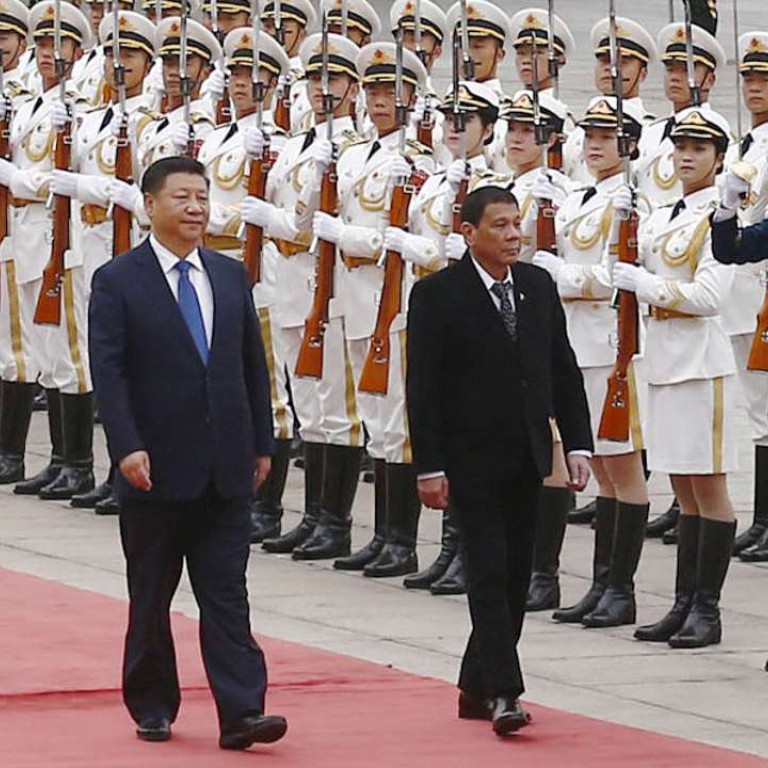
Analysis | Duterte’s tilt towards China set to ‘test US pivot to Asia’
Philippine President Rodrigo Duterte’s visit to China may not lead to a new alliance between the two countries, but has done enough to cause a setback to the United States’ pivot to Asia, observers said.
Relations between China and the Philippines, two competing claimants in the South China Sea, took a dramatic turn on Thursday when Duterte hailed a “springtime” of bilateral relations. It appeared to end three years of bilateral tension that started when Manila asked an international tribunal to rule on Beijing’s territorial claims to the disputed waters.
While the US insists it is neutral in the South China Sea disputes, it supported the Philippines’ application to the Permanent Court of Arbitration in The Hague and has conducted “freedom of navigation operations” in the waters.
Manila has also long been a key ally in the US’ rebalance to Asia strategy to counter China’s rise in the region. But Duterte announced his country’s “separation” from the US on Thursday.
The US embassy in Manila said Duterte’s statements were creating uncertainty, Reuters reported. “We have yet to hear from the Philippine government what Duterte’s remarks on ‘separation’ might mean,” an embassy spokeswoman said.
She also said the US would honour alliance commitments and treaty obligations with the Philippines. “And, of course, we expect the Philippines to do the same,” she said.
We have yet to hear from the Philippine government what Duterte’s remarks on ‘separation’ might mean
Duterte has questioned whether the US would defend the Philippines in case of military conflicts with China over the South China Sea.
The US has yet to confirm whether the Mutual Defence Treaty, which requires Washington and Manila to support each other if either of the two countries are attacked by a third party, would cover contested territories in the waters.
Sourabh Gupta, a Washington-based analyst with the Institute for China-America Studies, said Duterte’s trip “pits the US and China in direct security competition”, with Manila opting to “plump for the latter”.
Gupta said the US needed “a thorough recalibration” of its interests and strategy in its cooperation with the Philippines in the South China Sea.
“In entangling itself so strongly with the South China Sea disputes but failing thereafter to extend serious defence obligations to its treaty ally vis-à-vis the South China Sea issue, the US has only itself to blame,” he said.
Duterte is clearly hedging the Philippines’ foreign relationships more, but I’m not sure if [Manila] has clearly pivoted toward China
But Joshua Kurlantzick, a senior fellow at the Council on Foreign Relations, said Duterte’s sudden move towards China could be a tactic to extract more concessions from the US.
“Duterte is clearly hedging the Philippines’ foreign relationships more, but I’m not sure if [Manila] has clearly pivoted toward China,” Kurlantzick said. “It’s hard to see the Philippine security establishment backing a longer-term shift to China, other than boosting trade ties and investment, in the ways that Duterte wants.”
Philippine Trade and Industry Secretary Ramon Lopez sought yesterday to hedge the president’s comments.
Let me clarify. The president did not talk about separation
“Let me clarify. The president did not talk about separation,” Lopez told CNN Philippines in Beijing. “In terms of economic [ties], we are not stopping trade, investment with America. The president specifically mentioned his desire to strengthen further the ties with China and the Asean region which we have been trading with for centuries.”
He said the Philippines was “breaking being too much dependent on one side”.
“But we definitely won’t stop the trade and investment activities with the West, specifically the US,” he said.
Meanwhile, Beijing was watching with caution, Du Jifeng, a Southeast Asian affairs expert at the Chinese Academy of Social Sciences, said.
“We can’t take those words too seriously. We will still have to look at how the policy turns out, which is more important,” Du said.
Du said Beijing was aware that it would be “unrealistic” to expect the Philippines to completely cut ties with the US, as the sentiment within the Philippine establishment and public remained stronly in favour of siding with the United States.
“Duterte knows that the Philippines alone has limited leverage against the US. That’s why he wants to work with China and Russia in casting the Philippines’ influence on certain regional affairs,” Du said.
Additional reporting by Laura Zhou

